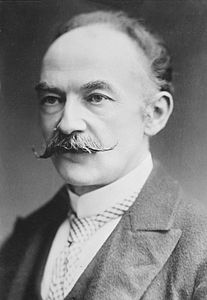The Two Men
Thomas Hardy 1840 (Stinsford) – 1928 (Dorchester, Dorset)
THERE were two youths of equal age,
Wit, station, strength, and parentage;
They studied at the self-same schools,
And shaped their thoughts by common rules.
One pondered on the life of man,
His hopes, his endings, and began
To rate the Market's sordid war
As something scarce worth living for.
"I'll brace to higher aims," said he,
"I'll further Truth and Purity;
Thereby to mend and mortal lot
And sweeten sorrow. Thrive I not,
"Winning their hearts, my kind will give
Enough that I may lowly live,
And house my Love in some dim dell,
For pleasing them and theirs so well."
Idly attired, with features wan,
In secret swift he labored on;
Such press of power had brought much gold
Applied to things of meaner mould.
Sometimes he wished his aims had been
To gather gains like other men;
Then thanked his God he'd traced his track
Too far for wish to drag him back.
He lookèd from his loft one day
To where his slighted garden lay;
Nettles and hemlock hid each lawn,
And every flower was starved and gone.
He fainted in his heart, whereon
He rose, and sought his plighted one,
Resolved to loose her bond withal,
Lest she should perish in his fall.
He met her with a careless air,
As though he'd ceased to find her fair,
And said: "True love is dust to me;
I cannot kiss: I tire of thee!"
(That she might scorn him was he fain,
To put her sooner out of pain;
For incensed love breathes quick and dies,
When famished love a-lingering lies.)
Once done, his soul was so betossed,
It found no more the force it lost:
Hope was his only drink and food,
And hope extinct, decay ensued.
And, living long so closely penned,
He had not kept a single friend;
He dwindled thin as phantoms be,
And drooped to death in poverty....
Meantime his schoolmate had gone out
To join the fortune-finding rout;
He liked the winnings of the mart,
But wearied of the working part.
He turned to seek a privy lair,
Neglecting note of garb and hair,
And day by day reclined and thought
How he might live by doing nought.
"I plan a valued scheme," he said
To some. "But lend me of your bread,
And when the vast result looms nigh,
In profit you shall stand as I."
Yet they took counsel to restrain
Their kindness till they saw the gain;
And, since his substance now had run,
He rose to do what might be done.
He went unto his Love by night,
And said: "My Love, I faint in fight:
Deserving as thou dost a crown,
My cares shall never drag thee down."
(He had descried a maid whose line
Would hand her on much corn and wine,
And held her far in worth above
One who could only pray and love.)
But this Fair read him; whence he failed
To do the deed so blithely hailed;
He saw his projects wholly marred,
And gloom and want oppressed him hard;
Till, living to so mean an end,
Whereby he'd lost his every friend,
He perished in a pauper sty,
His mate the dying pauper nigh.
And moralists, reflecting, said,
As "dust to dust" in burial read
Was echoed from each coffin-lid,
"These men were like in all they did."
Font size:
Submitted on May 13, 2011
Modified on March 05, 2023
- 2:50 min read
- 77 Views
Quick analysis:
| Scheme | XXAA BBCC DDEE XXFF GGHH XXII JJKK BLFX MMDD NNOO EXPP QQDD RRSS MMXE TTUU NNLL VVWW XXYY ZZ1 1 QQUU TT2 2 |
|---|---|
| Closest metre | Iambic tetrameter |
| Characters | 3,313 |
| Words | 570 |
| Stanzas | 21 |
| Stanza Lengths | 4, 4, 4, 4, 4, 4, 4, 4, 4, 4, 4, 4, 4, 4, 4, 4, 4, 4, 4, 4, 4 |
Translation
Find a translation for this poem in other languages:
Select another language:
- - Select -
- 简体中文 (Chinese - Simplified)
- 繁體中文 (Chinese - Traditional)
- Español (Spanish)
- Esperanto (Esperanto)
- 日本語 (Japanese)
- Português (Portuguese)
- Deutsch (German)
- العربية (Arabic)
- Français (French)
- Русский (Russian)
- ಕನ್ನಡ (Kannada)
- 한국어 (Korean)
- עברית (Hebrew)
- Gaeilge (Irish)
- Українська (Ukrainian)
- اردو (Urdu)
- Magyar (Hungarian)
- मानक हिन्दी (Hindi)
- Indonesia (Indonesian)
- Italiano (Italian)
- தமிழ் (Tamil)
- Türkçe (Turkish)
- తెలుగు (Telugu)
- ภาษาไทย (Thai)
- Tiếng Việt (Vietnamese)
- Čeština (Czech)
- Polski (Polish)
- Bahasa Indonesia (Indonesian)
- Românește (Romanian)
- Nederlands (Dutch)
- Ελληνικά (Greek)
- Latinum (Latin)
- Svenska (Swedish)
- Dansk (Danish)
- Suomi (Finnish)
- فارسی (Persian)
- ייִדיש (Yiddish)
- հայերեն (Armenian)
- Norsk (Norwegian)
- English (English)
Citation
Use the citation below to add this poem to your bibliography:
Style:MLAChicagoAPA
"The Two Men" Poetry.com. STANDS4 LLC, 2024. Web. 16 Apr. 2024. <https://www.poetry.com/poem/36580/the-two-men>.



Discuss the poem The Two Men with the community...
Report Comment
We're doing our best to make sure our content is useful, accurate and safe.
If by any chance you spot an inappropriate comment while navigating through our website please use this form to let us know, and we'll take care of it shortly.
Attachment
You need to be logged in to favorite.
Log In